Intro
Recognize low sugar symptoms alert signs like dizziness, fatigue, and shakiness. Identify hypoglycemia causes, effects, and treatments to manage blood sugar levels effectively.
When it comes to maintaining a healthy lifestyle, one of the most critical aspects to consider is our diet, particularly the amount of sugar we consume. Sugar, in its various forms, is present in a wide array of foods and beverages, ranging from naturally occurring sugars in fruits and vegetables to added sugars in processed and sweetened products. While sugar is a source of energy for the body, excessive consumption can lead to a multitude of health issues, including obesity, diabetes, and heart disease. However, the focus here is on the signs and symptoms that indicate your body might be reacting to low sugar levels, a condition medically known as hypoglycemia.
Understanding the symptoms of low sugar levels is crucial because they can vary significantly from person to person. Some individuals might experience mild symptoms that are easily manageable, while others might face severe reactions that require immediate medical attention. The severity and type of symptoms can depend on several factors, including the level of blood sugar drop, the rate at which it drops, and the individual's overall health and sensitivity to glucose fluctuations. Recognizing these symptoms early can help in taking prompt action, thereby preventing more serious complications.
The human body relies heavily on glucose as a primary source of energy, especially for the brain. When blood glucose levels fall below a certain threshold, typically below 70 mg/dL, it triggers a response from the body to increase glucose release from stored energy sources or to reduce glucose usage. This response includes the release of hormones like glucagon and adrenaline, which can cause a variety of symptoms. These symptoms can range from mild, such as hunger and sweating, to severe, including confusion, seizures, and even loss of consciousness in extreme cases. Being aware of these signs can empower individuals to manage their blood sugar levels more effectively, whether through dietary adjustments, medication, or other lifestyle changes.
Understanding Hypoglycemia
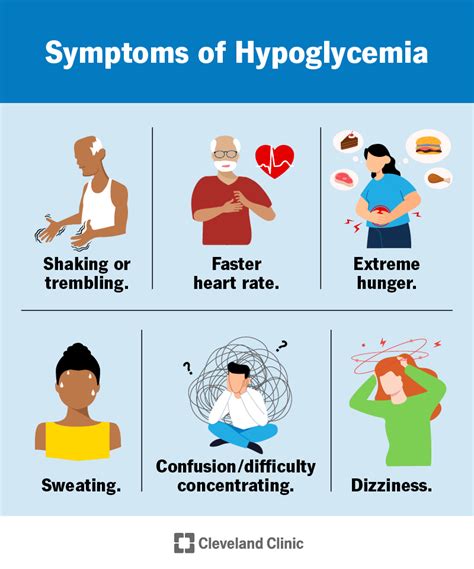
Hypoglycemia, or low blood sugar, is a condition that occurs when the level of glucose in the blood falls below the normal range. This can happen for several reasons, including skipping meals, taking too much diabetes medication, or having an underlying health condition that affects glucose regulation. It's essential to understand the different types of hypoglycemia, including reactive hypoglycemia, which occurs after eating, and fasting hypoglycemia, which happens when the body has not eaten for a while. Each type has distinct causes and may require different management strategies.
Recognizing the Symptoms
The symptoms of hypoglycemia can be categorized into two main types: mild to moderate and severe. Mild symptoms are often the first signs of low blood sugar and can include shakiness, dizziness, sweating, hunger, irritability, confusion, or difficulty speaking. These symptoms are usually manageable by consuming a quick source of glucose, such as fruit juice or glucose tablets. Severe symptoms, on the other hand, require immediate attention and can include inability to swallow, seizures, unconsciousness, or even coma in extreme cases.Causes of Low Sugar Symptoms
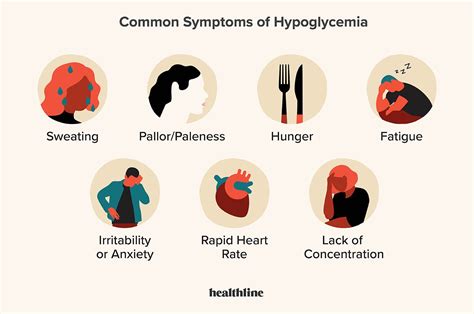
The causes of low sugar symptoms can be diverse and include dietary factors, certain medications, excessive alcohol consumption, critical illnesses, and endocrine disorders. For individuals with diabetes, the imbalance between insulin dosage and glucose intake is a common cause. Understanding these causes can help in preventing hypoglycemic episodes by making informed lifestyle choices and, when necessary, adjusting medication under medical supervision.
Prevention Strategies
Preventing low sugar symptoms involves a combination of dietary management, lifestyle adjustments, and, for those with diabetes, careful monitoring of blood glucose levels and medication adherence. Eating regular, balanced meals and snacks can help maintain stable blood sugar levels. For individuals prone to hypoglycemia, carrying a source of quick glucose, such as glucose tablets or juice, can be lifesaving. Regular physical activity is also beneficial, but it should be balanced with appropriate food intake to avoid triggering hypoglycemia.Managing Hypoglycemia
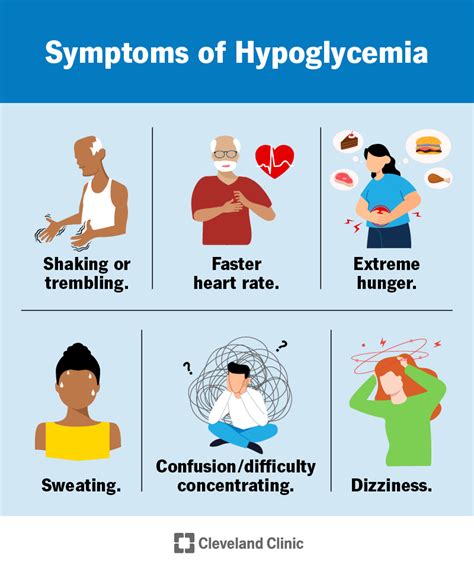
Managing hypoglycemia effectively requires a comprehensive approach that includes self-monitoring of blood glucose levels, adherence to medication regimens for those with diabetes, dietary adjustments, and lifestyle changes. Recognizing the early signs of hypoglycemia and taking prompt action can significantly reduce the risk of severe complications. For individuals at risk, having a plan in place, including emergency contacts and a quick source of glucose, is crucial.
Treatment Options
The treatment for hypoglycemia depends on the severity of the symptoms. Mild cases can often be treated by consuming 15-20 grams of glucose or glucose-containing foods, such as glucose tablets, fruit juice, or candy, and then eating a snack or meal to help stabilize blood sugar levels. In cases of severe hypoglycemia, where the individual is unconscious or unable to swallow, glucagon injections may be necessary. It's essential for family members, friends, and caregivers of individuals with diabetes to learn how to administer glucagon.Nutritional Advice for Hypoglycemia Prevention
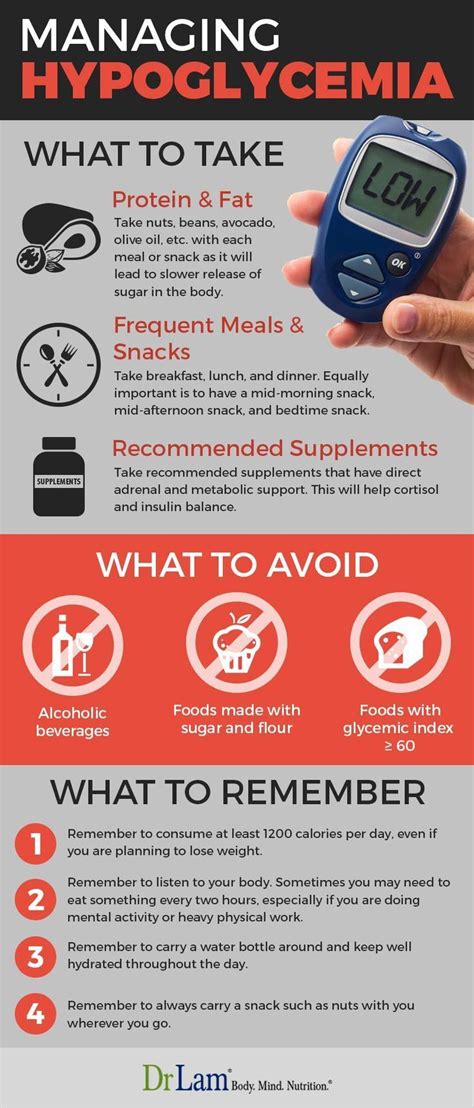
Preventing hypoglycemia through diet involves choosing foods that help maintain stable blood sugar levels. Foods with a low glycemic index (GI), which are digested slowly and cause a gradual rise in blood sugar, are recommended. Examples include whole grains, non-starchy vegetables, lean proteins, and healthy fats. Regular meals and snacks, balanced in carbohydrates, proteins, and fats, can help prevent large fluctuations in blood glucose levels.
Dietary Recommendations
Dietary recommendations for preventing hypoglycemia include avoiding skipping meals, limiting intake of high-sugar foods and drinks, and choosing complex carbohydrates over simple ones. Drinking alcohol in moderation, if at all, is also advised, as alcohol can interfere with glucose regulation. Staying hydrated by drinking plenty of water is essential, and for those with diabetes, working with a dietitian or healthcare provider to develop a personalized meal plan can be incredibly beneficial.Living with Hypoglycemia
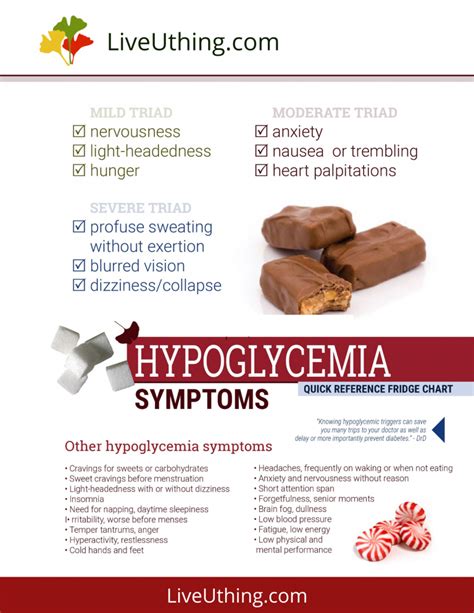
Living with the risk of hypoglycemia requires ongoing management and awareness. This includes monitoring blood sugar levels regularly, maintaining a healthy diet, staying active, and managing stress. For individuals with diabetes, this might also involve adjusting medication and insulin dosages under the guidance of a healthcare provider. Support from family, friends, and support groups can also play a significant role in managing the condition effectively.
Coping Mechanisms
Coping with the risk of hypoglycemia involves not just medical management but also psychological and emotional support. Individuals at risk should learn to recognize their personal signs of hypoglycemia, develop a treatment plan, and inform their loved ones about their condition and how to respond in case of an emergency. Keeping a record of hypoglycemic episodes can help identify patterns and triggers, allowing for more effective prevention strategies.Future Directions in Hypoglycemia Management
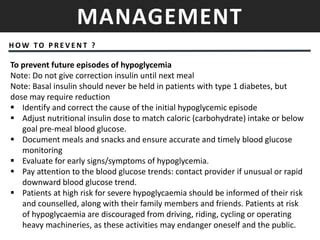
The future of hypoglycemia management holds promise with advancements in medical technology, pharmaceuticals, and our understanding of glucose metabolism. Continuous glucose monitoring systems, for example, allow for real-time tracking of blood sugar levels, enabling more precise management of diabetes and prevention of hypoglycemia. Research into new medications and therapies, such as those that mimic the action of incretin hormones to enhance glucose-dependent insulin secretion, may offer improved treatment options.
Emerging Technologies
Emerging technologies, including wearable devices and mobile applications, are also changing the landscape of hypoglycemia management. These tools can provide personalized advice, track glucose levels, and offer real-time alerts for potential hypoglycemic episodes. Furthermore, artificial intelligence and machine learning algorithms can analyze data from these devices to predict hypoglycemic events, allowing for proactive measures to prevent them.Conclusion and Next Steps

In conclusion, recognizing and managing low sugar symptoms is a critical aspect of maintaining overall health, particularly for individuals with diabetes or those at risk of hypoglycemia. By understanding the causes, symptoms, and management strategies for hypoglycemia, individuals can take proactive steps to prevent episodes and improve their quality of life. It's also important to stay updated with the latest research and technologies that are continually evolving the field of glucose management.
We invite you to share your experiences and insights into managing hypoglycemia, and we encourage you to reach out to healthcare professionals for personalized advice. By working together and staying informed, we can better navigate the complexities of glucose management and foster a community that supports and empowers individuals living with the risk of low sugar symptoms.
What is hypoglycemia, and how does it occur?
+Hypoglycemia, or low blood sugar, occurs when the level of glucose in the blood falls below the normal range, typically below 70 mg/dL. It can happen due to skipping meals, taking too much diabetes medication, or having an underlying health condition that affects glucose regulation.
What are the symptoms of hypoglycemia, and how can they be managed?
+The symptoms of hypoglycemia can range from mild, such as shakiness and hunger, to severe, including confusion and loss of consciousness. Mild symptoms can often be managed by consuming a quick source of glucose, while severe cases may require glucagon injections or immediate medical attention.
How can hypoglycemia be prevented through diet and lifestyle changes?
+Hypoglycemia can be prevented through dietary choices, such as eating regular, balanced meals, limiting intake of high-sugar foods, and choosing complex carbohydrates. Staying hydrated, avoiding excessive alcohol consumption, and managing stress through regular physical activity and relaxation techniques can also help.
